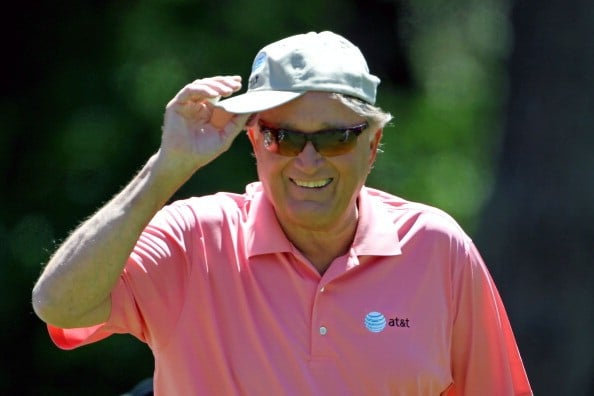What is Raymond Floyd’s Net Worth and career earnings?
Raymond Floyd is an American professional golfer who has a net worth of $40 million.
Raymond Floyd stands as one of golf’s most accomplished and respected competitors. Throughout his illustrious career spanning four decades, Floyd captured four major championships: the 1969 and 1982 PGA Championships, the 1976 Masters, and the 1986 U.S. Open. His remarkable longevity allowed him to compete at the highest levels well into his 50s, becoming the first player to win tournaments on both the PGA Tour and the Champions Tour in the same year (1992). Known for his piercing concentration, exceptional course management, and deadly putting stroke, Floyd amassed 22 PGA Tour victories and 14 Champions Tour titles. His mental toughness and tactical approach to the game made him a feared competitor, with Jack Nicklaus once remarking that Floyd’s “stare” was one of the most intimidating weapons in golf. Floyd’s contributions to the game were officially recognized with his induction into the World Golf Hall of Fame in 1989, cementing his legacy as one of the sport’s true masters.
Career Earnings
During his career, Raymond earned around $15 million in on-course earnings.
Palm Beach Mansion
In 2004, Raymond and his wife Maria built a 13,200-square-foot waterfront mansion in Palm Beach, Florida. They also constructed a small guest home on the lot next door. In 2012, Raymond sold this home for $21.12 million, setting a record for the area at the time.
Hamptons Mansion
In 1999, Raymond and Maria built a 10,000-square-foot estate on three acres in Southampton, New York. Raymond listed the property for sale in 2017 for $25 million. He lowered the price a few times but ultimately did not accept any offers and still owns this property today. Today, it’s worth around $14 million, according to estimates.
Jamie Squire / Getty Images
Early Life and Development
Raymond Floyd was born on September 4, 1942, in Fort Bragg, North Carolina. His introduction to golf came through his father, L.B. Floyd, a professional at Fort Bragg’s military course. By age 13, Raymond was already showing tremendous promise, and his golf development accelerated when the family relocated to Fayetteville. Despite also excelling in baseball and basketball during his youth, Floyd’s focus increasingly turned to golf. After graduating from high school, he briefly attended the University of North Carolina before turning professional in 1961 at just 18 years old.
Floyd’s early professional years were marked by a promising start—winning his first PGA Tour event at the 1963 St. Petersburg Open—followed by a period of inconsistency. During these formative years, he honed the mental toughness and strategic approach that would later become his trademark.
Rise to Prominence
Floyd’s breakthrough as an elite player came with his first major victory at the 1969 PGA Championship at NCR Country Club in Ohio, where he dominated the field with an impressive seven-stroke margin. This victory established him as more than just a talented player—it revealed his capacity to perform under pressure on golf’s biggest stages.
The 1970s saw Floyd elevate his status further with his masterful win at the 1976 Masters Tournament, where he led wire-to-wire and finished eight strokes ahead of Ben Crenshaw. His ball-striking precision and unflappable demeanor under Augusta National’s extreme pressure showcased his complete command of the game’s physical and mental aspects.
The Peak Years
The 1980s represented Floyd’s most consistent period, despite being in his 40s—an age when many golfers begin to decline. His second PGA Championship victory came in 1982 at Southern Hills, where he demonstrated remarkable precision and course management.
Perhaps his most impressive triumph came at the 1986 U.S. Open at Shinnecock Hills at age 43, making him the oldest U.S. Open champion at that time. This victory highlighted Floyd’s tactical brilliance, as he navigated the difficult course with exceptional skill and patience.
His competitive fire and remarkable consistency during this decade earned him the respect of fellow competitors and established him as one of golf’s elite performers regardless of age.
Ryder Cup Legacy
Floyd’s contributions to American golf extended beyond individual achievements to his significant impact on team competitions. He represented the United States in eight Ryder Cup competitions between 1969 and 1993, compiling an impressive 12-8-3 record. Later, he captained the 1989 U.S. team to retain the cup with a 14-14 tie at The Belfry in England.
His Ryder Cup experiences reflected the changing dynamics of the competition, from the era of American dominance to the emergence of a more competitive European team. Floyd’s leadership style emphasized calm determination and strategic thinking—qualities that defined his own playing career.
Later Career and Legacy
Unlike many players whose competitive edge diminishes with age, Floyd continued to excel well into his 50s. His transition to the Champions Tour (now PGA Tour Champions) was seamless, winning his first senior event at the 1992 GTE North Classic. That same year, he also won on the regular PGA Tour at the Doral-Ryder Open at age 49, becoming the first player to win on both tours in the same year.
Beyond his playing achievements, Floyd’s impact on golf included his course design work and mentorship of younger players. His comprehensive understanding of golf strategy informed his design philosophy, creating challenging but fair layouts that reward strategic thinking.
Raymond Floyd’s legacy encompasses more than his impressive collection of titles—it’s found in his embodiment of golf’s timeless values: persistence, mental fortitude, and the pursuit of excellence at any age. His career demonstrated that golf success depends not merely on physical skills but equally on intelligence, emotional control, and strategic wisdom.
All net worths are calculated using data drawn from public sources. When provided, we also incorporate private tips and feedback received from the celebrities or their representatives. While we work diligently to ensure that our numbers are as accurate as possible, unless otherwise indicated they are only estimates. We welcome all corrections and feedback using the button below.
Content shared from www.celebritynetworth.com.

